|
|
|
Sort Order |
|
|
|
Items / Page
|
|
|
|
|
|
|
| Srl | Item |
| 1 |
ID:
105091
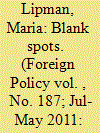

|
|
|
|
|
| Publication |
2011.
|
| Summary/Abstract |
In 1992, barely a year after the collapse of the USSR, three Russian lawyers were granted unprecedented access to the holy of holies -- the minutes of the Politburo, the Soviet Communist Party's highest body. President Boris Yeltsin was anxious to secure his political triumph by seeking to outlaw the Communist Party, and his lawyers were entrusted with using the historical records to prepare his case before the newly formed Constitutional Court.
|
|
|
|
|
|
|
|
|
|
|
|
|
|
|
|
| 2 |
ID:
105085
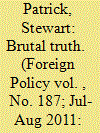

|
|
|
|
|
| Publication |
2011.
|
| Summary/Abstract |
The last 20 years -- so blandly labeled the "post-Cold War era" -- might as well be known as the "Age of Failed States." After decades of confronting Soviet power, successive U.S. administrations suddenly became embroiled in and bedeviled by the world's most dysfunctional countries. Although great-power competition persists, it is often the world's basket cases -- from Somalia to Afghanistan, Haiti to Liberia, and Pakistan to Yemen -- that dominate the U.S. foreign-policy agenda. This trend began in the early 1990s, when a shocking outbreak of state collapse and internal violence, including but by no means limited to episodes of genocide in the former Yugoslavia and Rwanda, seemed to herald a "new world disorder," in the words of British diplomat David Hannay.
|
|
|
|
|
|
|
|
|
|
|
|
|
|
|
|
| 3 |
ID:
105039
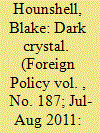

|
|
|
|
|
| Publication |
2011.
|
| Summary/Abstract |
In early March, California Sen. Dianne Feinstein, who heads the Senate Intelligence Committee, complained that America's spooks had failed to warn about the risks of uprisings in the Arab world. Instead, they had provided "nothing that we didn't read in the newspapers," she griped. "Whether it was Yemen, or Bahrain, or Egypt … nothing." James Clapper, the director of national intelligence, had been forced to acknowledge at an earlier hearing, "We are not clairvoyant."
|
|
|
|
|
|
|
|
|
|
|
|
|
|
|
|
| 4 |
ID:
105012
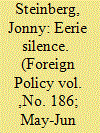

|
|
|
| 5 |
ID:
105035
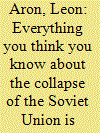

|
|
|
|
|
| Publication |
2011.
|
| Summary/Abstract |
Every revolution is a surprise. Still, the latest Russian Revolution must be counted among the greatest of surprises. In the years leading up to 1991, virtually no Western expert, scholar, official, or politician foresaw the impending collapse of the Soviet Union, and with it one-party dictatorship, the state-owned economy, and the Kremlin's control over its domestic and Eastern European empires. Neither, with one exception, did Soviet dissidents nor, judging by their memoirs, future revolutionaries themselves. When Mikhail Gorbachev became general secretary of the Communist Party in March 1985, none of his contemporaries anticipated a revolutionary crisis. Although there were disagreements over the size and depth of the Soviet system's problems, no one thought them to be life-threatening, at least not anytime soon.
|
|
|
|
|
|
|
|
|
|
|
|
|
|
|
|
| 6 |
ID:
105040
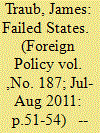

|
|
|
|
|
| Publication |
2011.
|
| Summary/Abstract |
Only some of them. It has been a truism of U.S. foreign policy since the 9/11 terrorist attacks that the United States is, in the words of President George W. Bush's 2002 National Security Strategy, "threatened less by conquering states than we are by failing ones." Defense Secretary Robert Gates has said that over the next 20 years, the gravest threats to America will come from failing states "that cannot meet the basic needs -- much less the aspirations -- of their people." Both as candidate and as president, Barack Obama has repeated this claim and has sought to reorient policy toward the prevention of state failure.
|
|
|
|
|
|
|
|
|
|
|
|
|
|
|
|
| 7 |
ID:
105038
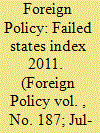

|
|
|
|
|
| Publication |
2011.
|
| Summary/Abstract |
The new edition of the index draws on some 130,000 publicly available sources to analyze 177 countries and rate them on 12 indicators of pressure on the state during the year 2010 -- from refugee flows to poverty, public services to security threats. Taken together, a country's performance on this battery of indicators tells us how stable -- or unstable -- it is. And the latest results show how much the 2008 economic crisis and its ripple effects everywhere, from collapsing trade to soaring food prices to stagnant investment, are still haunting the world.
|
|
|
|
|
|
|
|
|
|
|
|
|
|
|
|
| 8 |
ID:
105088
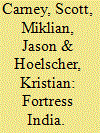

|
|
|
|
|
| Publication |
2011.
|
| Summary/Abstract |
Felani wore her gold bridal jewelry as she crouched out of sight inside the squalid concrete building. The 15-year-old's father, Nurul Islam, peeked cautiously out the window and scanned the steel and barbed-wire fence that demarcates the border between India and Bangladesh. The fence was the last obstacle to Felani's wedding, arranged for a week later in her family's ancestral village just across the border in Bangladesh.
|
|
|
|
|
|
|
|
|
|
|
|
|
|
|
|
| 9 |
ID:
105089


|
|
|
|
|
| Publication |
2011.
|
| Summary/Abstract |
According to the New Yorker, Barack Obama boned up on international affairs to prepare for the presidency by reading Thomas Friedman. For foreign-policy cognoscenti, this is like reading John Grisham novels to study for the bar exam. With most of the Republican 2012 wannabes, like Obama, having spent their careers focused on domestic issues (or in the case of Donald Trump, the Miss USA pageant), it seemed only fair for FP to help these international relations neophytes. So we asked an array of seasoned foreign-policy professionals and general smart folks to provide reading suggestions for our aspiring leaders. The one obvious conclusion? All roads to understanding American foreign policy run through Joe Nye.
|
|
|
|
|
|
|
|
|
|
|
|
|
|
|
|
| 10 |
ID:
105037
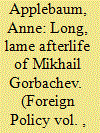

|
|
|
|
|
| Publication |
2011.
|
| Summary/Abstract |
In the most notable of the many photographs snapped at the gala held to mark his 80th birthday, Mikhail Gorbachev seems shorter and rounder than he did in his prime, back when he was one of the most important people in the world. He is inscrutable, only half-smiling; he also looks disheveled, and perhaps unsure of himself. Those impressions may of course be exaggerated by the fact that in this particular picture, the onetime general secretary of the Communist Party of the Soviet Union has his arm around Sharon Stone. Stone is wearing a slinky, champagne-colored dress and bright red lipstick. She is grinning widely. In heels, she is a good 6 inches taller than Gorbachev, which certainly takes away from his aura of authority.
|
|
|
|
|
|
|
|
|
|
|
|
|
|
|
|
| 11 |
ID:
105036
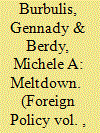

|
|
|
|
|
| Publication |
2011.
|
| Summary/Abstract |
That scum!" Boris Yeltsin fumed. "It's a coup. We can't let them get away with it."
It was the morning of Aug. 19, 1991, and the Russian president was standing at the door of his dacha in Arkhangelskoe, a compound of small country houses outside Moscow where the top Russian government officials lived. I had raced over from my own house nearby, after a friend called from Moscow, frantic and nearly hysterical, insisting that I turn on the radio. There had been a coup; Soviet leader Mikhail Gorbachev had been removed from power.
|
|
|
|
|
|
|
|
|
|
|
|
|
|
|
|
| 12 |
ID:
105090
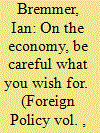

|
|
|
|
|
| Publication |
2011.
|
| Summary/Abstract |
Halfway through 2011, we've already seen an extraordinary year of volatility: turmoil across the Middle East and North Africa, the eurozone's ongoing fiscal crises, Japan's triple disaster, the killing of Osama bin Laden. Yet these dramatic events have obscured a slow-moving, underlying shift of much greater long-term importance: global rebalancing. In its simplest form, rebalancing means this: a reset of the global economy shifting the balance of accounts between the world's established and emerging powers or between its biggest consumers and biggest savers. That alone, of course, is a transition of landmark historic significance. Yet it is far from the only consequence, for rebalancing is not just an economic story, but one that will result in a seismic shift in the international balance of power, in every region of the world.
|
|
|
|
|
|
|
|
|
|
|
|
|
|
|
|
| 13 |
ID:
105087
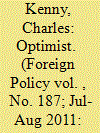

|
|
|
|
|
| Publication |
2011.
|
| Summary/Abstract |
The myth of the smug teetotaler is no joke. Many of the most popular theories of economic growth in wealthy countries, dating back to the Protestant work ethic of Max Weber, emphasize the abstemious and sober virtues of the well-to-do. And from the 18th-century Gin Acts in Britain to Prohibition in 1920s America to a certain class of modern-day economists, there's a long tradition of blaming intemperance for the persistence of poverty.
|
|
|
|
|
|
|
|
|
|
|
|
|
|
|
|
|
|
|
|
|